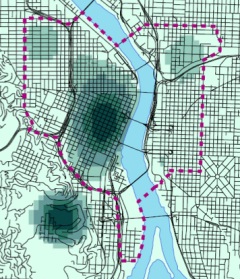The Bicycle Transportation Alliance (BTA) is making a big push to bring bike sharing to Portland. They’ve launched a petition campaign to demonstrate public support for the project, they are actively searching for the estimated $4 million in start-up funds, and they are gathering support from heads of transportation agencies and elected officials.
The project would blanket the Central City (on both sides of the river) with at least 74 rental stations and 740 bikes that could be used by the public for free or for a nominal fee. Project backers say they expect 500,000 new bicycle trips in its first year of operation. Start-up costs are estimated to be just under $4 million and annual operations costs would be about $1.5 million ($500,000 of which would be paid for through user fees, and $1 million would be paid for by sponsors).
“We believe the Portland Bike Share program is a tremendous opportunity to drive healthy lifestyle choices among Portlanders.”
— Kerry Barnett, Regence Blue Cross/Blue Shield
Currently, the project is on a short-list of projects that could get funded through a pot of Regional Flexible Funds doled out by Metro. Back in June, the City of Portland also applied for a grant through the Federal Highway Administration’s Transportation, Community, and System Preservation Program.
While the Mayor’s office had put the bike share project on hold for a while, as I reported back in April, there’s new momentum for making it happen.
The bike sharing project also has a broadening base of support. Portland Streetcar Inc. has lobbied the US Department of Transportation on its behalf and support letters have been written by U.S. Congressman Earl Blumenauer and Mayor Sam Adams. Adams refers to the project as an “integral part of our transportation system.”
“Portland Bikeshare will help maintain the balance between an aging system in need of repair that faces increasing capacity demands and maximizing the system in a cost-effective way using our existing right of way and promoting safety,” wrote Adams in a letter supporting the federal grant application.
In another sign of the project’s momentum, Regence Blue Cross/Blue Shield of Oregon has stepped up as the lead private sector sponsor of the program, saying it’s a “tremendous opportunity to drive healthy lifestyle choices among Portlanders.” (Regence’s sister company in Minnesota is in a similar partnership with the Twin Cities Nice Ride Bike Share program.)
The list of signatories on a federal grant application is also an impressive show of support for the project. Among the names are;
- Jeff Cogen, Multnomah County Chair
- Nina DiConcini, Oregon Department of Environmental Quality
- Jeff Miller, President & CEO of Travel Portland
- Rebecca Okken, Capital Bond Project Manager, Portland Community College
- Paul Carlson, Senior VP, Oregon Museum of Science and Industry
- Neal McFarlane, General Manager, TriMet
- Michael Powell, Chair, Portland Streetcar, Inc.
- Wim Wiewel, President, Portland State University
Last week, the BTA launched an online petition effort to demonstrate public support of the project. Advocacy Director Gerik Kransky says they got 775 signatures just over the weekend.

bikeshare service area.”
(Graphic: PBOT)
“The BTA is coming out swinging for this project because we think it will be the most cost-effective way to get more people on bikes,” Kransky said via telephone yesterday, “We saw an opportunity to be the lead champion of the project, so we’re taking that opportunity.”
Kransky knows that, while major bigwigs are lining up in support of Portland bike share, the politics aren’t perfect. Since the project focuses on the Central City, some people have raised the equity flag, saying that the City needs to put a higher priority on investments in further out neighborhoods.
On June 1st, the City of Portland held a public open house to get feedback on a list of projects in the running for what’s expected to be about $6-7 million in federal funds for active transportation projects. The only project to receive direct negative comments was Portland Bikeshare.
Carla Danley, a citizen activist and member of PBOT’s Bicycle Advisory Committee, doesn’t support the bikeshare project because she sees it as a “perk” that would only benefit downtown. She feels it also fails to address equity in transportation spending.
“PBOT struggles to receive positive press with regards to bike policy as it is, to pursue federal dollars for a Central City perk over addressing the transportation needs of long-neglected neighborhoods,” she wrote via email, “would be a PR nightmare for PBOT.”
Danley says she’d like to see more of a commitment from bikeshare backers that the stations would fan out all the way into the neighborhoods.
The BTA’s Kranksy says the $2 million they’re asking for from the Flex Fund pot would still be way less than half of the total spending — and the rest would likely go to a project for East Portland and Foster/Powell improvements (both of which have broad public support). Project backers also point to the 20,900 households and 153,000 jobs that the bikeshare stations will reach.
Kransky says part of the reason the BTA stepped up to support the project is because they felt bike-sharing was the “new kid on the block” and it was the only project on the City’s short-list for funding that didn’t have an organized group of advocates pushing for it.
Like many bike projects — especially innovative ones — there is a lot of politics involved. Mayor Adams has been working to bring bikeshare to Portland for years, but his recent tone (at least publicly) has been to push for basic improvements in outer neighborhoods. However, now that he’s not running for re-election in 2012, perhaps we’ll see him take bike share off the shelf and help push it through.
— For all the twists and turns taken by Portland’s effort to start a bike-sharing program, browse the BikePortland archives.


